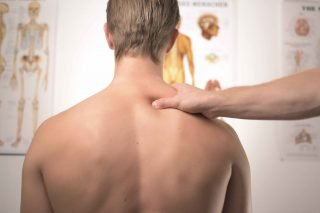Most of us go through some sort of muscle pain on a regular basis. You might get aches and pains after working out, or you might just experience them on a day-to-day basis. Even bending in the wrong position can cause you muscle pains. As you get older, it’s even more common. In this guide, we look at the causes of muscle pain and what you can do about it.
What Causes Muscle Aches?
Muscle pain can be caused by overuse of a specific muscle or over-stretching muscle tissue. You will often know exactly what has caused your muscle pain. If you have been to the gym and started to lift heavier weights then it is clear that this might be breaking down some of the muscle and causing it to ache as the body repairs itself.
Overuse of a muscle can cause muscle aches and pains. If it starts to ache during exercise, this can be a sign that it is going to hurt the next day.
You probably heard this from your gym teacher back in high school, but muscle aches can often come from not warming up or cooling down before and after you exercise. The muscles are more likely to pull, or even tear as a result.
If you have certain medical conditions you can be more prone to muscle aches, too. People who suffer from thyroid problems, such as hypothyroidism, often experience a lot more muscle pain. If you have hypokalemia, meaning low levels of potassium, you can also find yourself in muscular pain more often.
How to Ease Muscle Pain at Home?
There are many options for treatments you can use at home.
Using CBD oils or cannabis products can be a very good solution. They interact with the endocannabinoid system to provide an anti-inflammatory effect. This is a similar treatment to using over-the-counter pain relief products like ibuprofen. Some cannabis strains are naturally high in CBD, so medical marijuana can be helpful, too.
Marijuana-derived products are much less risky than opioids, which can be effective pain relievers, but they are also addictive and can lead to overdose. As the laws in the US continue to change regarding cannabis, more and more people are able to take advantage of medical marijuana or even recreational marijuana, depending on where you live.
You can apply ice or heat interchangeably. To start with, ice is a good way to treat new sprains and aches in your muscles. The first couple of days are the ideal time to ice an injury or an area in pain. After this, heat can be a more effective treatment. Both can help with the inflammation that causes pain.
There are a number of massage therapies that can also be effective, and some of these you can enjoy yourself. Some muscles you can self-massage. For instance, your legs can be massaged to soothe pain and increase circulation. Alternatively, you can use products such as massage rollers or even massage pads to release pain. Massage has been shown to greatly improve recovery time, but it isn’t suitable for everyone. If you have certain medical conditions, massage might actually do some harm.
What Causes Muscle Pain After a Hard Workout?

Experts call it “delayed onset muscle soreness” and sometimes abbreviate it to DOMS. This is the pain you experience 12-24 hours after a workout and that can last for a few days.
Most agree that the pain comes from tiny tears in your muscles. These tears break down the fibers and often grow back stronger, causing muscles to grow. Tears cause inflammation and therefore pain. This is why a lot of people turn to cannabidiol or CBD, which is a powerful anti-inflammatory with very few side effects.
When to See a Doctor
A lot of muscle pain can be treated at home and will go away in time. However, it can be a sign that there is something more serious wrong. In certain scenarios, you should go to the doctor to try and get more help as you might need tests to see if the muscular pain is coming from a long-term illness.
Occasions that call for a visit to the doctor include:
- If you have a lot of muscular pain with no clear cause or reason why.
- If you get muscle pain after a tick bite, or you have a rash along with muscular pains.
- If there is a lot of redness or swelling in the area.
- If the pain doesn’t go away on its own (or with home treatment) within a few days.
- If you have recently changed medication, and you think this might be contributing.
- If you have a temperature along with muscle pain.
- If the pain is unbearable.
You will probably get a pretty good idea of whether muscular pain is “normal” or not. If you have overexerted yourself at the gym then it is normal to have a couple of days of aching. You can treat this yourself. However, if there is any change, abnormal rash or the pain persists then a doctor should be consulted.
Conclusion
Because muscular pain is so common, it’s essential to come up with a method of managing it. Luckily, there is plenty that you can do at home to decrease muscle aches and pains, and this can become a part of your post-workout routine!



![women [longevity live]](https://longevitylive.com/wp-content/uploads/2020/01/photo-of-women-walking-down-the-street-1116984-100x100.jpg)










